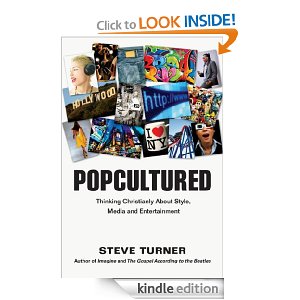Steve Turner, born in 1949 Northamptonshire England, is a Christian who is a journalist, poet and writer. He currently lives in London. He has written several significant books on famous rock musicians and bands who have had some connection with Christianity— namely on Eric Claption, Van Morrison, and U2. As a music journalist he interviewed many of the mainstays of British pop and rock music, including Lennon and McCartney and David Bowie.
He is imminently qualified to talk about this aspect of pop culture, but oddly, strangely, in his new book Popcultured (IVP, 2013) he almost completely fails to do so, and this in spite of his admission that surveys suggest that if a person was given the choice of taking one form of pop culture with them when they were exiled to a desert island, 64% said it would be there tunes. And it’s not like there wasn’t room in this book which is only a little over 200 pages of text for a good juicy chapter on pop music (cue the 1979 one hit wonder song by M— ‘popmuzik’——
[N.B. historical note– British white guys like M were making pop hits out of a form of rapping, not singing, long before the rap craze, beginning in the late 80s and ever since].
In other words, Steve mostly avoids talking about the one subject he is most qualified to discourse on in this book. This is unfortunate because this book is otherwise an admirable survey of various fields of pop culture and a Christian understanding of pop culture. Color me disappointed with this aspect of this book. At the same time, there is much to commend about this book. Here is the IVP summary of what the book is about….
“There’s no avoiding popular culture—we’ve been enculturated into it. What does it mean to be faithful Christians in a pop culture world? How do we think Christianly about celebrity and leisure? Some Christians try to abstain from “worldly” pursuits, while others consume culture indiscriminately, assuming it has little effect on them. But if Christ is Lord of all of life, then there ought to be Christian ways to engage with and appreciate popular culture.
“Steve Turner has spent his career chronicling and interviewing people from the worlds of music, film, television, fashion, art and literature. Now he provides an insider’s guide to a wide range of entertainment pursuits, with biblical frameworks for understanding pop culture genres and artifacts. Turner explores
how movies use redemptive narratives and parables
ways journalistic headlines convey worldview assumptions
differences between famous people in the past and celebrities today
what ideas are communicated through clothing and fashion design
how technology changes our sense of what is real
and much more
God entrusts culture to us and gives us the ability to critique it, enjoy it and create it. This book will help you become a better cultural critic, consumer and creator.
Read more: http://www.ivpress.com/cgi-ivpress/book.pl/code=3768#ixzz2ZcCF8PMC
The book begins with general chapters on how pop culture has in part arisen as a response to the increasing leisure time and disposable income of many people in the West. There is a chapter defining the term, and one attempting to provide some Biblical parameters for assessing pop culture. Then there is a series of survey chapters on journalism, celebrity culture, fashion, comedy, advertising, technology, photography (where the author strangely claims he is a professional photographer— p. 200, but journalism and writing, not photography would be better said to be his proper profession), TV and movies, including one on Christian themes and attempts at TV and movies, and more.
Clearly Steve is well read in these various fields in so far as they deal with or represent and create various aspects of pop culture, and each chapter ends with some good bibliography, some questions for thought, and some websites to consult. This is all quite valuable as are the numerous statistics and specific examples in this book which put flesh on the bones of a discussion of pop culture. I will say more on the particulars in a subsequent post. Here, however, I want to say something about the attempts at Biblical and Christian reflection on these aspects of popular culture. Sometimes Steve does a good job of connecting Biblical ideas (both theological and ethical) to the analysis of pop culture. But sometimes his enthusiasm for pop culture seems to overwhelm his critical judgment. Let’s take one example from late in the book.
On p. 218, while talking about Mel Gibson’s ‘The Passion of the Christ’ we find this comment—-
“What was so unexpected about ‘the Passion’ was that it was radical without being liberal, authentic without being sentimental, orthodox without being dull, new without being modern (or postmodern). Its one shortcoming was that in making the violence more graphic than in previous Jesus films, it left the impression that Christ’s sufferings for sin were primarily physical and visible rather than spiritual and unseen.”
That was the only thing wrong with this film??? Not even close. Some 35% of this film comes not from the Bible or Biblical research but from the mystical and sometimes anti-Semitic writings of a nun, Anna Catherine Emmerich, particularly from the ‘Dolorous Passion of the Christ’.
I will certainly grant that this movie is a powerful movie. It hits you like a sledge hammer, but in fact the use of Emmerich’s material skews the Biblical picture in lots of ways, and there have been important collections of essays by Jews and Christians demonstrating how historically skewed and problematic this film is.
At it’s heart it focuses too much on Jesus’ pre-crucifixion suffering, which is mentioned only in passing in the NT (cf.Mk. 14.43-52;Mt. 26.47-56; Lk. 22.54; John 18.1-11) compared to the focus on the death of Jesus on the cross. The reason for this is clear. Gibson believes in passion mysticism, the notion that suffering itself is redemptive. The Gospel writers by contrast stress that atonement for sin only transpires because of what happened on the cross. Had Jesus been flog, and then released, there would have been no redemption, no atonement for sins because there was no life poured out in death. By overplaying the flogging, throwing in non-Biblical bits like Mrs. Pilate providing clothes to mop up the blood (since the blood itself is seen as healing in passion mysticism, and the cloth thereby becomes a magical relic) and the like Gibson concocts a powerful presentation that in various ways is misleading and does not agree with the presentations of the four Gospels.
[Further sad note— the movie The Gospel of John, with excellent production values and acting, which was a verbatim of the Gospel of John, came out at the same time as Gibson’s movie and yet the church in its wisdom didn’t go to that movie but rather patronized Gibson’s movie. Bad choice, and showed the general Biblical illiteracy of the church itself at the beginning of the 21rst century.]
On this point one should read some of the essays in Perspectives on the Passion of the Christ (published by Mirimax Books in 2004) in particular I would commend the essay I wrote called ‘Numbstruck: An Evangelical Reflects on Gibson’s Passion of the Christ’, and the essay written by A.J. Levine as well. In short, Gibson chose to take the liberty to add violence to the depiction of Jesus’ sufferings prior to and on the cross, and in this case at the expense of the Jews, when in fact John 18.12 is very clear– the soldiers sent to arrest Jesus were chiefly Romans, and it was Romans who executed Jesus, not Jews.
What is sometimes, but not always, lacking in this book by Steve is sufficient critical analysis from a Biblical point of view when it comes to the various sub-fields of popular culture. In my next post on this book, however I will happily be able to say much more positive things about the merits of this book.














